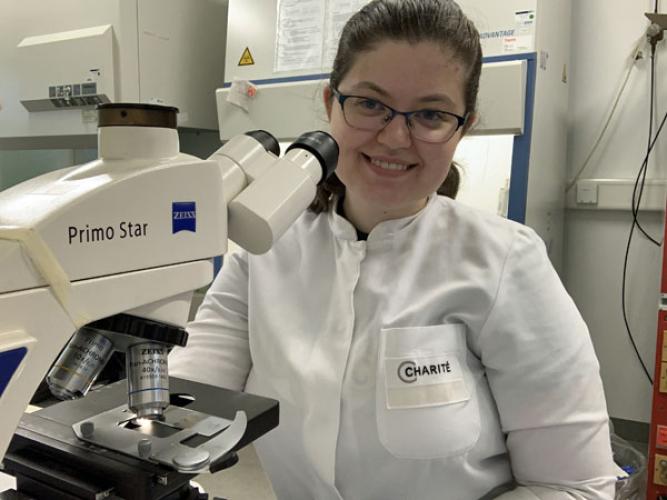
Riley Zielinski finally nails it in the lab, then tops her success with Germany internship

Riley Zielinski was in the biology lab late at night, running her experiment—again.
"I had no faith it would work. It hadn't the last eight times, wasting about a week of work every time. I was honestly sick of it, ready to give up and try another project for my thesis," recalled Zielinski, a senior in the Honors Tutorial College biology program, with minors in chemistry and anthropology in the College of Arts and Sciences.
"But then slowly, as the plate reader spit out the data in bright colors in an Excel file, I realized my experiment worked. It actually worked! I had just done the thing I had dreamed of since childhood. I generated new knowledge for the human species. I was a scientist, undoubtedly and unquestionably. That was the first moment where I felt like I had this whole thing down," she added.
That was one successful step on Zielinski's path to graduate school, where she plans to pursue a Ph.D. and work on a globally relevant infectious illness like malaria or tuberculosis.
This past summer, she took another leap and headed to Germany for an internship with Research Internships in Science and Engineering (RISE) Germany—even though she didn't really know how to speak German and she'd never traveled outside the United States.
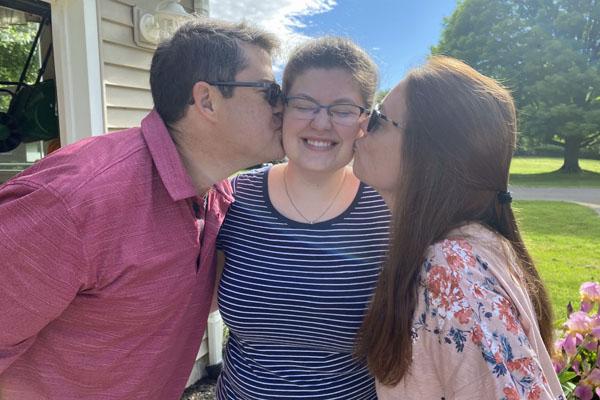
RISE Germany is a summer internship program at top research institutions across Germany in the fields of biology, chemistry, physics, earth sciences, engineering and computer science.
Fortunately for Zielinski, the working language is English, so she could easily work with her mentors, Professor Frank Mockenhaupt and doctoral student Welmoed van Loon, at the Institute of Tropical Medicine and International Health at Charité-Universitätsmedizin Berlin, where she was a member of the Malaria Research Group.
"I heard about this program my freshman year, through a friend and mentor in the HTC. She had applied and received the award, and encouraged me to apply as well once I was ready. With the ongoing COVID-19 pandemic, I chose to wait until this year to apply, so this has been a dream in the making for a few years now," Zielinski said.
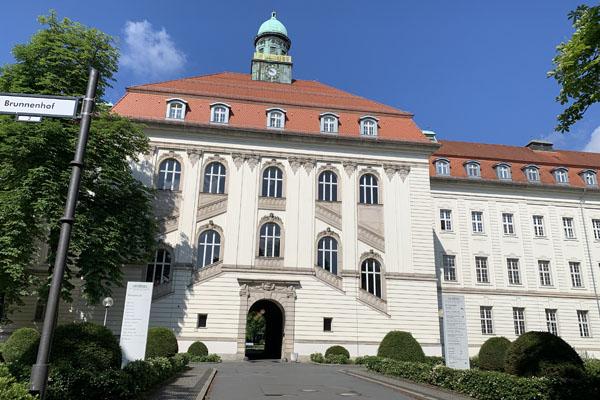
"I have never taken any German classes, and I barely spoke any German when I landed on German soil. I've learned a lot there through immersion and necessity. I learned to count to nine so that I didn't get on the wrong U-Bahn train, and how to explain my food allergy, but thankfully most people in Berlin speak English and helped me out when my three months of DuoLingo language learning wasn't sufficient," she said.
But Zielinski said her experience was not without a little bit of culture shock.
"I had never left the United States before this trip," Zielinski added. "I was ready for the big differences (the language, the public transportation, the food, etc.), but I was surprised by how many small things threw me off. Their bike lanes are on the sidewalk in Berlin, and I almost got hit by a bike my first day there because I didn't know I was walking in a bike lane. I regularly walked past buildings older than my country; in fact the hospital where I worked was founded in 1710. Small things like this continued to surprise me every day, and it made living in a place like Berlin so much more exciting."
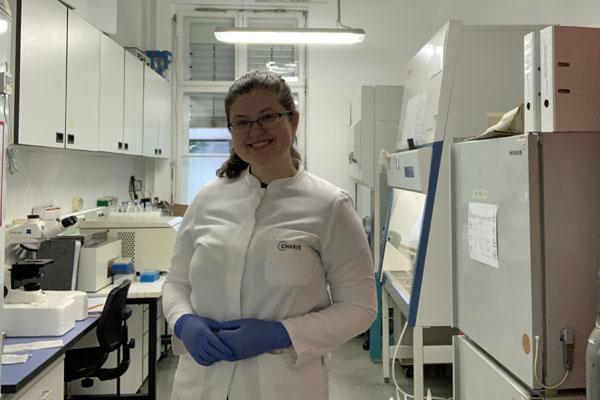
Zielinski felt more easily at home in the lab, where her research focused on understanding the factors affecting malaria growth within the human host.
"The relationship between the parasite that causes malaria and the internal environment that the host provides is extremely intricate, and any differences that might occur in parasite multiplication due to varying conditions are important factors to understand when making general health advisements in malaria-prone areas," Zielinski said. "For instance, my current research project is focused on understanding the relationship between a state of anemia, or low blood iron, in the host and parasite growth. The results of these experiments could theoretically influence public health policy, but more directly will help us understand what makes a favorable host for the malaria parasite," she explained.
Q&A with Riley Zielinski
Q: Who are your OHIO favorite professors and how did they make an impact on your life?
A: I have a laundry list of people to thank at OHIO, for shaping me into the person, scientist, and student I am today. First, Dr. Soichi Tanda, who met me when I was a 17-year-old high school senior in his biology lecture and decided to take a chance on me and admit me into the HTC. His constant mentorship, guidance, and caring presence have been gifts as I adjusted to college and as I have begun my preparations for what will come after graduation.
Dr. Ronan Carroll, my principal investigator in the Carroll lab, has always put his unwavering faith in me and my science, even when others would not. His dedication to the people who work in his lab has given me so much confidence to face whatever may come in my career as a scientist and academic.
Dr. Corinne Nielsen taught me how to think like a scientist, Dr. Janet Duerr gave me my first lab position, and Dr. Laura Saltman showed me the wonderful world of microbes, where I've found my academic home. The faculty at OHIO are an outstanding asset of the college. Support for all your ambitions will be everywhere you look on our campus.
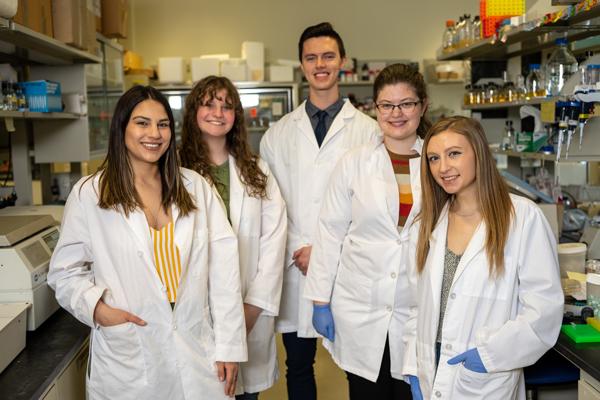
Q: What was the hardest hill you had to climb (not counting Jeff Hill) at OHIO? And how did you overcome challenges or obstacles in your path?
A. While Jeff Hill is obviously a contender (Morton Hill in the winter is another beast entirely), my personal White Whale has always been my own self-confidence. I have a habit of downplaying my successes and instead focusing on the next accomplishment or deadline. However, my support system here at OHIO is full of people willing to help me celebrate all of the good things that happen, no matter how small I may perceive them to be. I owe a lot to the friends and mentors I have here who are excellent at making me stop and appreciate every bit of achievement I have.
Q: What are your favorite OHIO memories?
A. A lot of my favorite memories at OHIO are from my involvement outside of the classroom. The pride I felt when the OHIO Women's Crew Team finished our second race in one day—over 20 kilometers of rowing total. Meeting my freshman roommate on the College Green three days before move-in, not yet knowing that she would still be one of my very best friends to this day. Plus 6 a.m. rowing practices in Ping, and getting breakfast afterward with my teammates. Hikes, late nights at Alden, and early mornings on the water with my friends.
Q: What’s the one thing you would tell a new OHIO student not to miss?
A. Get off campus—go hiking at Strouds, see the Hocking Hills in the fall, explore the surrounding communities and the unique culture found in the foothills of the Appalachians. There is so much to see and do on campus, but there is so much to experience in the surrounding areas as well.
